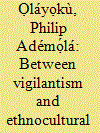| Srl | Item |
| 1 |
ID:
156545


|
|
|
|
|
| Summary/Abstract |
Postmodern contradictions in postcolonial Nigeria have led to the fetishisation of alternative local security measures often labelled as vigilante activities. The profiling of these groups as ethnic militia often undermines their essential bid to provide security while delimiting security needs to the physical. The fallouts of such profiling are frictions between federal security agents and ethnic-based security groups, often resulting in violence, as exemplified by the 7 May 2013 incident between the Nigerian federal security agents and the Ombatse. This study focuses on the emergence and activities of the Ombatse as an alternative security apparatus of the Eggon. It presents three years of field research which entailed the use of ethnography, key informant interviews and observation. The findings reveal that the Ombatse emerged to assert historical legitimacy for both the physical and spiritual securitisation of the Eggon through a return to the ancestral ways of social engineering. The study considers the security challenges in Nigeria, and also situates the Eggon historical context within political, religious, sociocultural and economic intersections of securitisation. It concludes that the Ombatse situates its legitimacy within the Eggon past and retains its relevance through the holistic focus of providing both physical and spiritual security.
|
|
|
|
|
|
|
|
|
|
|
|
|
|
|
|
| 2 |
ID:
131768


|
|
|
|
|
| Publication |
2014.
|
| Summary/Abstract |
This article presents an ethnographic investigation of displaced Karen in a border area of northern Thailand, and in particular, the reasons for their enthusiasm for the wrist-tying ceremony. It examines the way in which Karen ethno-nationalists have both influenced this cultural practice and appropriated it. This study argues that Karen nationalist intellectuals invented and reinvented the tradition of wrist-tying by borrowing structure and content from the use of soul-calling for healing and other purposes. The invented tradition is persuasive and efficacious because of its continuities and ties with existing cultural practices. Ordinary Karen participants utilise vernacular elements of the wrist-tying rite - such as sensory experiences through the handling of ritual objects - to assure a well-balanced life and spiritual security.
|
|
|
|
|
|
|
|
|
|
|
|
|
|
|
|
| 3 |
ID:
185567


|
|
|
|
|
| Summary/Abstract |
While there is a growing interest in conflict-related sexual violence (CRSV) against men, conceptual understanding and empirical knowledge are still inadequate. The notion of spiritual security is introduced in this article as an explanatory variable in CRSV, using survivors' discursive views of sexual violence victimizations in Nigeria's north-eastern region. The CRSV of males, it is argued, may also be understood as a ritual or spiritual activity carried out for bodily protection, financial prosperity, or socio-political ascendency. The survivors' impressions of CRSV's spiritual undertones are not unrelated to the heteronormative and collectively homophobic culture in their society, in which violent same-sex relations are considered so perverse and meaningful only if they are conceived as ‘evil or devilish practices’. Spiritual beliefs and practices, on the other hand, determine much of the social reality of many people in various parts of the world, and they are regarded as potent on security issues ranging from physical protection to wealth creation and socio-political advancement. This study adds to the continuing discussion on the reasons behind CRSV against men.
|
|
|
|
|
|
|
|
|
|
|
|
|
|
|
|